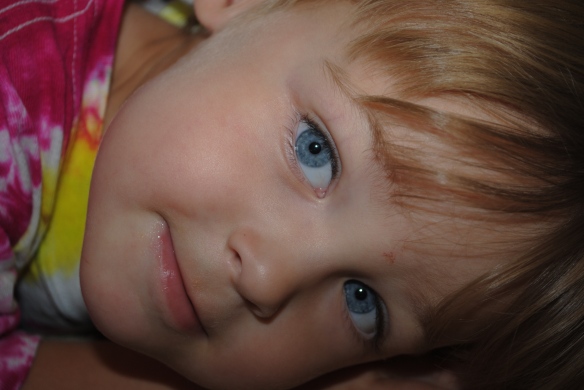The weekend out of town with old friends was as wonderful as I’d hoped, and I returned home (extremely tired, but that’s part of the game) to about what I expected: requests I’d made had been ignored but everyone was alive. Husbot reported that on Sunday morning, Gbot awoke early, as usual, and announced, “Mbot ate Mama.” Then he added sadly, “Mama was our friend.”
His explanation for my absence made me want to laugh and cry at the same time. And up until a couple of weeks ago I might have just left it at “oh, how cute.” But I have been reading a book called “Bad Guys Don’t Have Birthdays: Fantasy Play at Four” (The University of Chicago Press, 1988) It was written by Vivan Gussin Paley nearly twenty-five years ago, won the 1990 James N. Britton Award, and should be required reading for anyone who’s ever walked into Party City and purchased a candle in the shape of the number 4.
At the time she wrote this slim volume, Ms. Paley had been a preschool teacher for two decades. In order to understand the complex systems of play she witnessed daily among three- and four-year-olds, she began recording conversations and transcribing them each evening, documenting the children’s play and interaction, discerning patterns, connecting the play to events occurring in each child’s life, examining the interpersonal dynamics and excavating the “rules” of play. The book follows a group of four-year-olds through a school year, acting out such complications as a new baby in the family, parents working, the appearance of an older relative’s boyfriend.
“In fantasy play” writes Paley, “you sidestep that which cannot be controlled and devise scenes in which fears are resolved.”
Discovering this book was like unearthing the Rosetta Stone to Mbot’s play and conversation, or, for fans of Hitchhikers Guide to the Galaxy, like having a Babblefish on my shoulder: I suddenly and, it felt, magically, am beginning to understand the language he and Gbot use to describe the world they create daily–or rather create, change, destroy, and re-create–so richly inhabited by good guys and bad guys, Good Luke (Skywalker) and Bad Luke, Good Spiderman and Bad Cockroach Spiderman, Wonder Woman and Cinderella and Ree-punzel and dragons and four-headed monsters and bullet guns and laser beams and dy-no-mite.
What is all this violent talk and bam-bam-bam! with a Trio “gun”, I often wondered, when Mbot has trouble watching any movie–from Ratatouille to Babe–without running with a yelp into the kitchen while I fastforward through the parts where anyone is talking or acting in a hurtful way?
In part, here’s what this talk is: he is acting out his fears and overcoming them–just like Paley’s students do:
“A master of disguises, Fredrick will conjure up new dangers and, with a flick of his cape, be the instrument of rescue. In so doing it is he who is saved.”
He is taking control of his world. In Paley’s words, “Any unknown, it seems, can be made into a bad guy.” And in play, “I pretend, therefore I am. I pretend, therefore I know.”
If Mbot ate me, Mbot’s the bad guy, and my absence in much less threatening than if I had left on purpose. And in the bots’ world, it is a fact–reinforced in everything from Burt Dow, Deep Water Man to Your Body Battles a Stomachache–that what has been eaten can be rescued, regurgitated, or resurrected. And my return Monday morning showed him he was right.

